Jill Williamson on Writing, ‘Darkness’ and Light In Fiction, Part 1
Introduction: today Speculative Faith begins expanding to other media with The Portal podcast. Download the audio edition of this interview (right-click and select “Save As …”). Part 2 will be available Friday, April 22.
[audio:http://www.speculativefaith.lorehaven.com/theportalpodcast/JillWilliamson_part1_SF_04.15.2011.mp3]
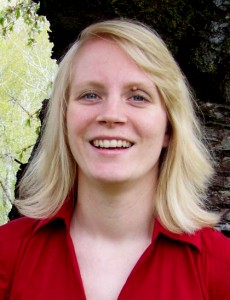 How has your day been going?
How has your day been going?
It has been going fabulously. I’m almost caught up with things — it makes me feel very good.
I’ve got ten questions written down for you, but I imagine that we’ll go in all kinds of directions besides that. Let’s begin, of course with discussing the now-complete Blood of Kings trilogy. For those who don’t know, do you want to recap where your ideas came from? Then you might venture to guess why the series has proven so popular with readers.
How I got the idea to write it? … Sure! I was walking with my son, and he was a baby in the stroller, and we were walking in Burbank, California. We passed by a house that had burned down, and I stopped to look at it. And there was a tree in the yard that had half burned down, but the part that was hanging over the street — it was still alive and leafy green.
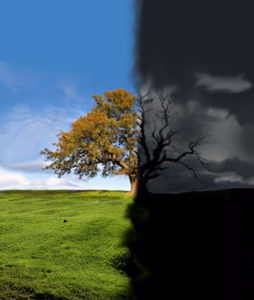 So I just stared at it for a while and thought it was really cool. And so I ran home and I Photoshopped it, as best I could. And that’s kind of the image that’s on my website header, the JillWilliamson.com site — the header there is kind of what I came up with after that. I was just really inspired by the idea of a land cursed in darkness, and what that would mean. I started brainstorming my story world. It took me about three months, but after that, I was ready to write.
So I just stared at it for a while and thought it was really cool. And so I ran home and I Photoshopped it, as best I could. And that’s kind of the image that’s on my website header, the JillWilliamson.com site — the header there is kind of what I came up with after that. I was just really inspired by the idea of a land cursed in darkness, and what that would mean. I started brainstorming my story world. It took me about three months, but after that, I was ready to write.
Now when you say brainstormed your story world, do you write all the details of this world, or have by any chance a giant notebook about it?
I do have a giant notebook.
I think I’ve seen your giant notebook! But can you tell what it’s like for others who haven’t seen it?
(Laughing) I was like, How did you know? I forgot I had it. … When I started brainstorming my story world, I drew a map to start, and then I had dots all over the map to represent cities, and I needed to come up with names for those cities.
I also wanted to have information about the different areas of the land that made these places different from the other places in the land. And so I started to brainstorm, and I actually made little character charts for each city. So I would write down the names of the lord and the lady and the children and anybody important in that town.
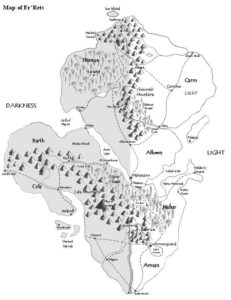 I researched comparable locations in the world, to how I wanted it to be in my map, so if I had a place that was supposed to be desert-like, I might look up Arizona, or a place in Africa, and come up with a list of the kind of animals that lived there, and what they did for industry. That would help me think about what the people in that village might do. So I spent time doing that for every city on my map, and I started adding that to the binder. I had a pile of papers what was just too big, and I needed to organize it. So that’s what I started to do, and it took me a while. I had a fun time doing it! And sometimes I would draw a castle sketch, if I thought it was important, and a lot of the story would take place there. I like to be able to see it in my mind, a little clearer, so I could then see it on paper — so I would sketch out things too, and add those to the place in my binder that had that city.
I researched comparable locations in the world, to how I wanted it to be in my map, so if I had a place that was supposed to be desert-like, I might look up Arizona, or a place in Africa, and come up with a list of the kind of animals that lived there, and what they did for industry. That would help me think about what the people in that village might do. So I spent time doing that for every city on my map, and I started adding that to the binder. I had a pile of papers what was just too big, and I needed to organize it. So that’s what I started to do, and it took me a while. I had a fun time doing it! And sometimes I would draw a castle sketch, if I thought it was important, and a lot of the story would take place there. I like to be able to see it in my mind, a little clearer, so I could then see it on paper — so I would sketch out things too, and add those to the place in my binder that had that city.
So for you — do you think it was sort of a combination, or which came first: the world-plotting or the story-plotting?
Ah, it’s hard to remember! I think I had an idea about the story first. But I didn’t know what to do with it, until I saw the tree. I think that’s what happened.
I had this weird dream that gave me this idea for a story, and it was like a science-fiction-world dream that was like, floating cars and blasters and things like that. … But it gave me an idea for a plot of the story. I hadn’t started to write it, but I had wanted to, and didn’t know where I was going to go with it. Then when I saw the tree and started brainstorming about what that might be, I thought that that would work really well with that plot idea.
Then somewhere along there I made the choice to make it medieval and not science fiction, futuristic planet.
Once I did that — I got distracted. I still didn’t spend any time writing the story until I spent about three months playing with my story-world. And that’s when by husband finally said, Aren’t you going to write a book? And I was like, Oh, okay, yeah. I guess could be done with this story world. Then I started to actually write the story.
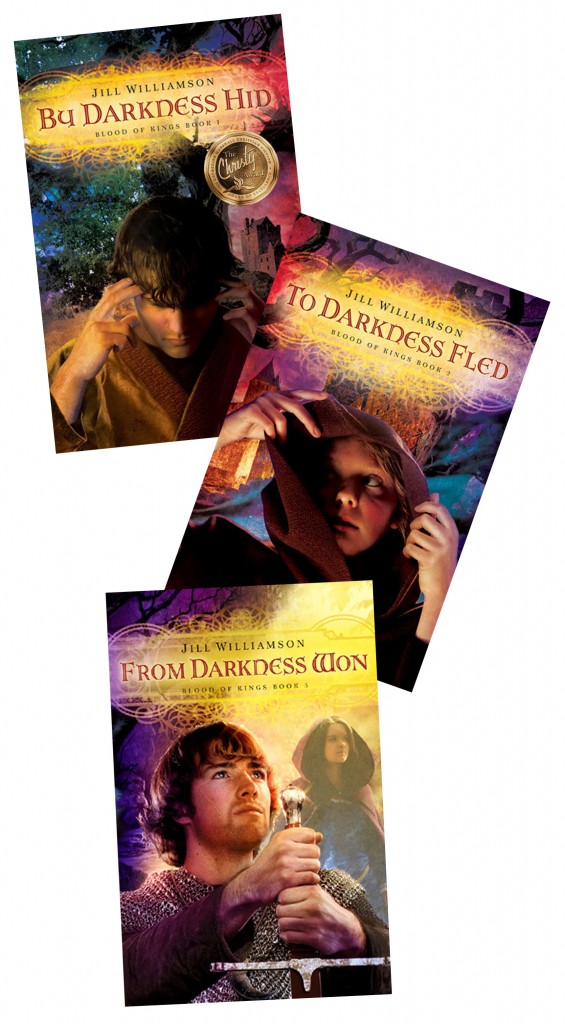 That’s where I’d like to ask about the themes of By Darkness Hid and the rest. By the way, I haven’t read the third one yet; I have definitely read the first two and recommended them and done all that good stuff.
That’s where I’d like to ask about the themes of By Darkness Hid and the rest. By the way, I haven’t read the third one yet; I have definitely read the first two and recommended them and done all that good stuff.
So I’m curious about the story theme. Some of them are familiar to readers, especially Christian readers, like the need for faith in God and that sort of thing. Others, though (at least to me) they seemed pretty new, like the dilemma between the (keeping this spoiler-free!) between the male and female lead characters at the end; they have this dilemma. And I’m wondering if the themes just seem to develop themselves, or before you start writing, or started writing one of the books: do you have a pretty good idea of where they’re going to go?
No. (Laughs) I did know how I wanted book three to end, obviously; I had that much down. So I knew what I wanted to happen to my characters very vaguely. But how book two ended had to end that was if there was going to be a book three — because if I had ended it the way everybody wanted, there wouldn’t be so much motivation to read book three. Know what I mean? … I had to be careful. But I also felt like that’s what my character would have done, even though people are mad at her. (Laughs)
I did see a few reviews that said, Hey, don’t worry, for those of you who are mad at Vrell, things get all straightened out in book three.
I think that girls could stand to be a little … they could stand to have higher standards for the guys that they’re interested in, than most girls do today.
Most girls would be like, Well he likes me, so we’re going to go out. That’s it? Is there anything else you’ve chosen? You know, you can have choices too.
I kind of wanted to explore that. And I never intended to go there with it, but that’s where it ended up and that’s where the story was. It made good sense, and it made room for some very interesting themes in the third one, because of where I left off in the second one. None of that relationship stuff was planned.
Do you want to give us a little hint as to what themes you explore and flesh out further in book three?
Ah, hmm.
Themes — not who dies and who marries whom or any of that! Abstracts.
(Laughs) Well, let’s see. There’s always the theme of light and darkness — that’s been a theme through all three books. … There’s a thread in there about Vrell coming to think about the lies she told and how they’re controlling her and changing her and forcing her, how they’ve affected her life. Then there’s a theme in there about Achan and discovering like a generational sin kind of a thing — like that’s a possibility for his life and he needs to guard against that. So I had some of those threads in there … I didn’t plan those, really, they just came about because of where the story was.
You’re a youth pastor’s wife, I’ve read in other interviews. So a lot of these, I think, are ringing true with readers because although the setting is fantasy, they’re familiar situations. I’m curious how your real-life experiences with teenagers have contributed to where your story goes and how you understand your characters?
Oh, very much so, especially in book two; I had the knights trying to train Achan in the ways he should behave with girls. … Vrell already has been trained that way, and that’s why she’s very guarded. I think that our culture could really use some of that wisdom.
Most kids today wouldn’t want to hear a word about it from anyone. … But I think that deep down they do want to hear … if that makes sense. They have so many questions, and most families tend not to talk about these kinds of things until their kid is a teenager and is already, like all of a sudden — Oh wait, you said you had a boyfriend at school; when did this happen? And then it’s like, We’d better have a talk.
You’ve got to start when your kids are little, and just mention things to them from the start so that you always have that open communication and your kids are kind of trained.
That’s always been something I noticed in the years of youth ministry I had … not most, but many parents just don’t talk to their kids about these kinds of things. And relationships are huge for teenagers, not just dating ones but just friendships too. They sometimes will rank that higher than any other relationship when they’re in that age. If you’ve been talking to your kid all along, then your kid will listen to some of that stuff.
I try to give my characters in the story mentors that they would at least hear from and consider heeding that wisdom.
[That] matches what I’ve heard about some youth ministries, where — while not to paint all Christian parents like this — I’ve heard that some Christian parents seem to think, Well, that’s the youth pastor’s job, is to teach my teenager or pre-teenager how to interact with the opposite sex and stay pure.
I’d disagree on that one! … No one can show their kids a better example of a relationship than a mom and dad. I know that’s not always possible for every family because of circumstances. … But they’re with you twenty-four-seven, when they’re with us once or twice a week. Mom and Dad have much more time to invest.
We do our best. We do. But we need to be a team effort!
The best youth ministries I’ve heard about add to what the parents are already teaching their kids at home … what the Bible says and what the Gospel is.
Getting back to By Darkness Hid, though, and the Blood of Kings trilogy — a personal note: I’ve tried to figure out, what is it about these books that I’ve enjoyed? Some of it seems really traditional fantasy: the castles and the swords and the knights and the kings. One could think, Well, we’re heard all this before. But to me it’s almost like hearing a song that seems like I’ve heard it before, even though I know that’s a new song.
I guess I’m asking you to brag a little bit here! Is it intentional that you’ve combined traditional elements with newer things?
That’s always how I wanted to write. Before I started writing, I was frustrated with people — parents, mostly — complaining about certain types of books their kids were reading. And I could understand them concerned about the content. But I thought, Well, why can’t there be a Christian book that writes about this stuff that kids care about in an equally entertaining way as the general-market books do? So I started to read a lot of the Christian fiction that was out there and … come up with my own game plan and way of trying to do that.
I’ve always always been a ministry-minded person, and it’s always been on my heart to try to help — help anyone who might be looking for help. I’ve always wanted to try to provide that realism in my stories.
Do you see stories as a great way to do that? Teenagers still like stories, it seems.
Oh sure! Stories are a great way to do that, if you don’t do that in a preachy way — which I hope I haven’t done. Kids will read a story [who] will never give you the time of day, face-to-face. I’ve had kids in my youth group who — they’ll show up one week, and I’ll never see them again. But what’s kind of funny is if one of them grabs my book and reads it, then they’ll personally open up to me in a different way. It’s like they connected with me then.
Even though I can’t be a youth pastor to everybody who reads my book, it softens them, if that make sense. The story got them thinking about things that didn’t even think they were going to want to think about.
Sort of like Jesus and parables, by any chance?
I guess, yeah!
Interesting you should mention it, because this was one of the very next questions I had written down. You’ve said that it was the Harry Potter debate that gets around a lot that originally was part of the process that helped you to want to write stories that would glorify God. And for me, it was seeing you write on the old version of Speculative Faith a few years ago — you had some constructive, critical comments about Twilight — that’s what made me want to read your books. … Any further comments on either one of those series? Are they helpful to kids, harmful, a mixture?
(Laughs) I don’t want to go on one side or the other of them. I think that you could find good and bad things in any story. I think what tends to happen with any of these stories that get so big so big, is that they just become a kid’s everything. Like what’s happening with the Twilight books now — it’s just crazy. (Laughs) We are just out of control! … It’s a romance novel, and they added weird to it! People went crazy. But that’s what it was.
They’re very different series. Harry Potter is very different than Twilight. Twilight is about a romance, and Harry Potter is about defeating evil if you had to pick something. …
 I guess I’d say a mixture, then. The less we — people who are against them throw a fit, the quicker they go away. A lot of times when you start saying This is an evil book! — or whatever people might say — kids just want to read it all the more. Instead of saying that, hand them a different book, if you’re concerned about it! There’s some themes in there that can be dangerous, but there’s also some good themes in there. I think there’s more good themes in the Harry Potter books than I would think would be in Twilight. Twilight just is a little bit obsessive-relationship-themed. (Laughs) In my opinion!
I guess I’d say a mixture, then. The less we — people who are against them throw a fit, the quicker they go away. A lot of times when you start saying This is an evil book! — or whatever people might say — kids just want to read it all the more. Instead of saying that, hand them a different book, if you’re concerned about it! There’s some themes in there that can be dangerous, but there’s also some good themes in there. I think there’s more good themes in the Harry Potter books than I would think would be in Twilight. Twilight just is a little bit obsessive-relationship-themed. (Laughs) In my opinion!
That very topic is addressed on Speculative Faith today — Becky Miller, April 11th, wrote about that. She has a nice black-and-white picture of Edward and Bella there on the front; it’s absolutely delightful.
What do you like that is out there, from either Christian authors or non-Christian authors, anybody. You mentioned, hand them a different book. Aside from your books, what do you like, either from traditional publishers or new arrivals like Marcher Lord Press, your publisher?
… If you like fantasy in the Christian fiction market, I love Andrew Peterson’s Wingfeather Saga; the first one’s called On the Edge of the Dark Sea of Darkness. Those are really fun.
There’s also Donita K. Paul’s books.
But if you try to go more current … Robert Liparulo’s Dreamhouse Kings is a really fun series, and boys really like that one, as well as girls.
There’s another new series from Thomas Nelson called Chaos, which is about spies that fight aliens, I think is how you would classify it! That one’s called Invasion, and that’s a good one for boys too.
Ted Dekker has his Lost Books that did really well.
(As soon as we’re done talking, I’ll probably be like, I should have said that one!)
… And Marcher Lord Press has great books for teens too. Teens would read any of them.
But especially The Word Unleashed … that’s Steve Rsaza: this is about a boy in outer space and that’s cool.
Then there’s the Hero Second Class and Hero in Hiding, which are satire fantasies. …
Anything Marcher Lord Press does is pretty fun. …
Teens in the Christian market for non-speculative: some great girl books would be anything Jenny B. Jones writes — she writes contemporary humor. I just laugh so hard I cry. I love her books; they’re fun and wonderful. …
You can go to NovelTeen.com … and you can find anything that myself or some of my review buddies have read that’s Christian teen fiction.
This is a math question I was thinking about earlier — a math question for a writer, if you don’t mind if I spring this one on you. It is about the readers of your books. I’m curious about how many of them are young-adult readers / teenagers and how many are older readers? I’ve heard people say, Oh yeah, Jill Williamson, I love By Darkness Hid and the rest, who are among both groups.
I have idea what the breakdown would be. … I would say I hear more from teens, but it’s probably like a two-thirds, one-third [ratio], as far as people who email me and tell me that they read it and liked it — that would be my guess. I do hear from quite a few adults, and most of the time they tell me too, because they must have heard me say that I write for teens: I’m such-and-such years old, and I liked your book. Okay! Thank you!
And of those, who is trying to write a book of their own? … It seems like everybody who enjoys fantasy and science fiction stories — of Christian teens or teens who enjoy Christian books — they’re also like, Yeah, I’ve also got this other story that I’m working on.
… At least half of that two-thirds, I think … at least half probably like to write. Most of the time, if someone emails me, I usually ask them: do you write? when write them back, because I’m just curious. But I never actually kept track. Might be kind of fun.
How about a non-math question? This is a frequent topic for Speculative Faith, as we’re exploring speculative literature from a perspective that seeks to honor God and truth, and presenting beauty in new ways. Let’s talk about Christian fiction, whether it’s speculative or not. … What is your opinion about the current Christian novel market? Do they address issues facing teens, or just facing people? Or from what you see, what changes might you suggest, perhaps to address underused themes, or answer questions that aren’t often discussed?
Non-speculative books, in my experience, having read almost anything I can get my hands on — Christian young-adult literature-wise — the non-speculative does a really good job. Contemporary books by like Melody Carlson and Cindy Martinusen Coloma … just all kinds of books that are geared towards girls do a wonderful job. They’ll talk about anything, and Christian publishers will publish just about anything in that genre for teen girls.
But they haven’t done it so much for the boy audience. Boys don’t tend to read contemporary fiction. So it doesn’t really work there. It worked for that To Save a Life book, which became a movie — I think the movie really helped it. So I don’t know how many boys would read the book by itself, though, had they not seen the movie.
So contemporary-wise, usually, especially for girls — they’re doing a really good job, and they’re really on top of things.
For the speculative market, though, it’s different. That’s just something I wanted to do; I thought, why not write about these things in the speculative market? … The stories sell well, as they are, just being fun stories for boys without having to really think about some really current issues. That’s what I like to do. I think that they could do a little better on that.
But I know that some publishers area really gearing up to try to do that.
Such as?
I don’t know if I can say it! I think ZonderKidz is, from what I know about them. They bought my next book, and I know they’re excited about young-adult — not just speculative, but about the future of young-adult in the Christian market. I think that they’re excited about making that a little bigger and publishing some more books than they normally might have done in the past. And they’re open to paranormal and steampunk and dystopian and weird genres that most Christian publishers haven’t really done yet. They’re open to doing that in an edgier kind of way. They’re looking to do what the general market’s doing.
I haven’t heard that out of the mouth of an editor. I just sense it. And from what I’m hearing that they’re interested in. … I would think that maybe they’re not the only ones. But they’re the ones I have experience with because of recently selling to them; that’s that I’ve heard.
That is great to know. … I did not know that they actually bought your book, and I’m going to ask you about in a moment and try to get as many spoilers as I can get for sure!
































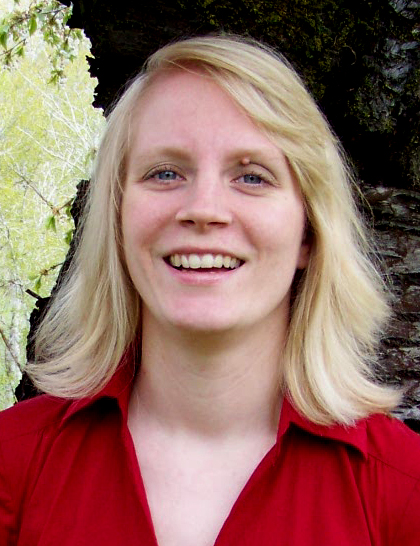


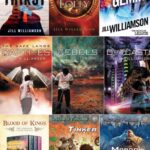
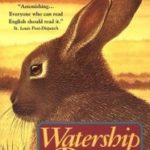





Interesting interview
This was so much fun to read. You two sounded like you were having fun. I really enjoyed getting a peek into the process.
Thanks for the interview, Stephen! It was fun.
Sally and Galadriel- thanks for reading! 🙂
Jill
Great interview! I’m looking forward to Part 2. 🙂